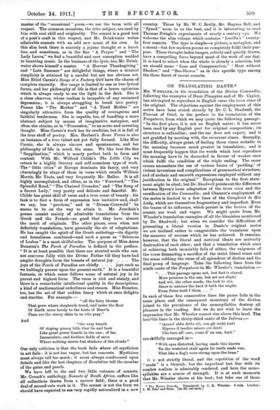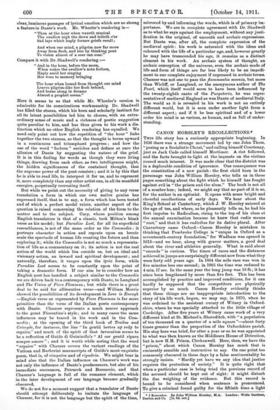ON TRANSLATING DANTE.*
WHEELER, in his translation of the Divine Commedia, following the examples of Dean Plumptre and of Mr. Cayley, has attempted to reproduce in English verse the terse rime of the original. The objections against the employment of this metre have been stated already by Dr. C. L. Shadwell, the Provost of Oriel, in the preface to his translation of the Purgatorio, from which we may quote the following passage : "In the first place, it is not an English metre: it has never been used by any English poet for original composition ; its structure is unfamiliar; and the ear does not expect, and is not gratified by meeting with, the recurrent rimes. Secondly, the difficulty, always great, of finding three rimes suitable to the meaning becomes much greater in translation ; and it must frequently happen that the words which best reproduce the meaning have to be discarded in favour of weaker ones which fulfil the condition of the triple ending. The same causes necessitate the use of various forms of padding,' of violent inversions and complications of grammatical structure, and of archaic and uncouth expressions employed without any justification in the original." Exceptions to the first state- ment might be cited; but Dr. Shadwell points out the difference between Byron's loose adaptation of the term rime and the versification of the Commedia; and Chancer's employment of the metre is limited to a few lines of the Compleint to His Lady, which are themselves fragmentary and imperfect. Even the traces of its influence, which persist in the terzine of the sonnet, are weak and vague. We might quote from Mr. Wheeler's translation examples of all the blemishes mentioned by Dr. Shadwell ; but when we consider the difficulties of presenting a literal version in Dante's original metre we are inclined rather to congratulate the translator upon the measure of success which he has achieved. It remains, however, that the literal and metrical ideals are mutually destructive of each other; and that a translation which aims at achieving both invariably fails of either, the exigences of the verse demanding a sacrifice of the strict literal sense and the sense robbing the verse of all splendour of diction and the final pomp of language. Take the following lines from the ninth canto of the Purgatorio in Mr. Wheeler's translation :— " . . . This passage opens not, but fast is stayed.
More precious is the one, but art not slight And wit, the other needs, the lock to stir, Since to unloose the knot it hath the might. From Peter hold I them.. . ."
In each of these five consecutive lines the pause falls in the same place, and the consequent monotony of the diction joined to the prevalence of the monosyllables destroy all pleasure in the reading. But we do not wish to leave the impression that Mr. Wheeler cannot rise above this level. The hort4ble lines in the thirty-third canto of the Inferno :— " Quand' ebbe detto cib, con gli occhi torti Riprese il teschio misero coi denti Che furo osso, come d' un can, forti" are skilfully managed in—
With eyes distorted, having made this known On the wretched skull again his teeth made war, That like a dog's were strong upon the bone."
It ie not strictly literal, and the repetition of the word " made " is a blemish ; but the important last line with its sombre realism is admirably rendered, and here the mono- syllables are a source of strength. It is at such moments that Mr. Wheeler shows at his best; but take one of those • The Divine Comedy. Translated by C. E. Wheeler. 8 vols. London J. H. Den' and Sons. [2s. 8d. net each.]
clear, luminous passages of lyrical emotion which are so strong a feature in Dante's work. Mr. Wheeler's rendering is- " Then at the hour when waxeth musical
The swallow nigh the dawn and telleth o'er Sad lays which haply former griefs recall ;
And when our mind, a pilgrim now far more Away from flesh, and less by thinking pent To vision almost of a seer can soar."
Compare it with Dr. Shadwell's rendering :— " And in the hour, before the morn, When wakes the swallow's note forlorn, Haply amid her singing Her woes to memory bringing The hour when loosed from thought our mind
Leaves pilgrim-like her flesh behind,
And borne along in dreams Almost a prophet seems."
Here it seems to us that while Mr. Wheeler's version is admirable for its conscientious workmanship Dr. Shadwell has filled the stanza, which his keen and scholarly instinct for
all its latent possibilities led him to choose, with an extra- ordinary sense of music and a richness of poetic suggestion quite peculiar to him, and has thus given to his work a dis- tinction which no other English rendering has equalled. We need only point out how the repetition of "the hour" links together the two stanzas, so that the thought is borne upward in a continuous and triumphant progress ; and how the use of the word " forlorn " enriches and defines at once the allusion of Dante by suggesting the nature of the grief.
It is in this feeling for words as though they were living things, drawing from each other, as two intelligences might, the hidden significances of the contained thought, that the supreme power of the poet consists ; and it is by this that he is able to read life, to interpret it for us, and to represent it, more completely than any other artist can, in all its manifold energies, perpetually recreating itself.
But while we point out the necessity of giving to any verse translation a form in which our own native genius has expressed itself, that is to say, a form which has been tested
and of which a perfect model exists, another aspect of the question is raised concerning the relation of the form to the matter and to the subject. Cary, whose position among English translators is that of a classic, took Milton's blank verse as his model ; but Paradise Lost, for all its superficial resemblances, is not of the same order as the Commedia : it portrays character in action and repeats upon an heroic scale the spectacle of human life creating the future and then exploring it; while the Cornmedia is not so much a representa-
tion of life as a commentary on it; its action is not the real action of the world which lies outside us, but an ideal and visionary action, an inward and spiritual development ; and naturally, therefore, it verges upon the lyric form, while
Paradise Lost seems to be constantly upon the point of taking a dramatic form. If our aim be to consider how an English poet has handled a subject similar to the Commedia we are driven back to a contemporary with Dante, to Langland and The Vision of Piers Plowman; but while there is a great deal to be said for alliterative verse—and William Morris showed the possibilities of its development in Love is Enough —English verse as represented by Piers Plowman is far more primitive than the verse of the Italian poets contemporary
with Dante. Chaucer represents a much nearer approach to the great Florentine's style ; and in many cases the same
influences may be traced in his work and in the Com- media; at the opening of the third book of Troilus and Criseyde, for instance, the line "In gentil hertes ay redy to repaire," and much of the spirit of that invocation seems to be a reflection of Guido di Guinizello's "Al cor gentil ripara sempre amore " ; and it is worth while noting that the word " repair° " with Chaucer covers the variant readings of the Vatican and Barberini manuscripts of Guido's most exquisite poem, that is, of rimpaira and of ripadria. We might bear in mind also that the Italian influence on Chaucer's work was not only the influence of Dante's predecessors, but also of his immediate successors, Petrarch and Boccaccio, and that Chaucer's language is full of the romance element, which in the later development of our language became gradually
obscured.
We do not for a moment suggest that a translator of Dante should attempt deliberately to imitate the language of Chaucer, for it is not the language but the spirit of the time,
mirrored by and informing the words, which is of primary im- portance. We are in complete agreement with Dr. Shadwell as to what he says against the employment, without any justi- fication in the original, of uncouth and archaic expressions. But Dante was, after all, the complete expression of the mediteval spirit : his work is saturated with the ideas and coloured with the life of a particular age, and, however greatly he may have transcended his age, it remains as a distinct element in his work. An archaic system of thought, an archaic conception of the universe, even the archaic mode of life and form of things are far less likely to be an impedi- ment to our complete enjoyment if expressed in archaic terms. Chaucer was not one to pass the jfammantia moenia, but more than Wicliff, or Langland, or the anonymous author of The Pearl, which itself would seem to have been influenced by the twenty-eighth canto of the Purgatorio, be was repre- sentative of mediteval England as was Dante of mediteval Italy. The world as it is revealed in his work is not an entirely different world, but it is seen under another light from a different aspect ; and if it be less spiritual and of a lower order his mind is as various, as human, and as full of under- standing.



















































 Previous page
Previous page